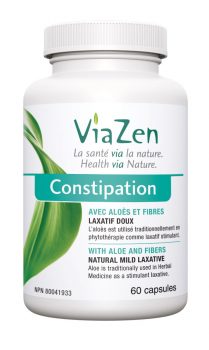
- Infos
- Understanding
- References
Viazen Constipation, a powerful synergy of natural active ingredients.
The association of Viazen Constipation components is the key of the effectiveness of this SUPERIOR FORMULA.

Who should take Viazen Constipation?
Viazen constipation offers a natural added-value solution to quickly and effectively relieve occasional or chronic constipation.
Viazen Constipation Presentation
|
ACTIVE INGREDIENTS |
THERAPEUTIC PROPERTIES |
|
Aloe |
This plant extract is known for its stimulant laxative effect. It increases intestinal motility.
|
|
Glucomannan |
This medicinal plant is known for its mucilaginous laxative effect. It increases the volume and water content of feces, which ensures a better intestinal regularity.
|
|
Fennel |
This medicinal plant is known to relieve bloating and flatulence. It has spasmolytic properties and therefore contributes to soothe abdominal pain.
|
|
Slippery elm |
Their soluble fibers provide an anti-irritant effect on intestinal mucosa. The emollient effect of slippery elm facilitates bowel movement.
|
* Maximum daily dosage corresponding to 3 capsules of Viazen Constipation.
Non-medicinal ingredients
Microcrystalline cellulose, magnesium stearate from plant origin, pitted plum fruit and gelatin. Viazen Constipation contains no wheat, soya, corn, yeast, peanut, gluten, egg and dairy products. It contains no preservatives, edulcorants, colouring agents or artificial flavours and is exempt of GMO.
Presentation : 60 capsules
Recommended use
Viazen Constipation will be taken as needed to relieve constipation in an amount of 1 to 3 capsules once a day, a few hours before or after taking other medications or natural health products. The effect will be felt from the first use.
In order to fully benefit the product, it is important to drink at minimum 1.5 liters of water per day.
Anticipated results
1) Relief of occasional and chronic constipation
2) Increase of intestinal motility
3) Emollient effect
4) Elimination of bloating and flatulence
5) Relief of intestinal mucosa irritation
6) Soothing of abdominal pain
7) Improving quality of intestinal flora
8) Feeling of abdominal lightness
CAUTIONS
– Can cause soft stools, flatulence, diarrhea and/or abdominal discomfort.
– While taking thiazide diuretics, corticosteroids, licorice root, or other medications or natural health products that may aggravate electrolyte imbalance.
– While taking cardiac medications (such as cardiac glycosides or antiarrhythmic medications).
– In presence of the following health disorders: diabetes, kidney disorder, faecal impaction or symptoms such as abdominal pain, nausea, vomiting or fever.
– Reduce the dose or discontinue use if you experience abdominal pain, cramps, spasms and/or diarrhea and consult a health care practitioner if symptoms persist and/or worsen.
– Consult a health care practitioner if you experience chest pain, vomiting, or difficulty swallowing or breathing after taking Viazen Constipation.
CONTRAINDICATIONS:
– Do not use if you are pregnant or breastfeeding.
– Do not use if you have abnormal gastrointestinal tract constriction, swallowing disorder, potential or existing intestinal blockage, atonic bowel, appendicitis, inflammatory colon disease (such as Crohns disease or ulcerative colitis), abdominal pain of unknown origin, undiagnosed rectal bleeding, severe dehydration with depleted water and electrolytes, hemorrhoids or diarrhea.
– Do not used if you are allergic to anethol or plants belonging to the Apiaceae/Carrot family.
What is constipation ?
Constipation occurs when a delay or difficulty in bowel movements is observed. It can be occasional (travel, stress, pregnancy, etc.) or chronic. Chronic constipation is when the problem persists from at least six to twelve months.
The normal frequency of bowel movements varies from one person to another. It may be from three times a day to three times per week. Constipation occurs when stools are hard, dry and difficult to pass. Generally, this occurs when stools are rare, less than three times a week. However, constipation can occur even in the presence of daily evacuation.
There are two forms of constipation. Transit constipation (or progress constipation); in presence of slow passage of feces within the intestinal tract. Terminal constipation (evacuation constipation); when feces accumulate in the rectum due to poor anorectal motility. The two conditions may coexist in the same person.
What exactly happens?
During digestion, the intestines contract to move food through the digestive tract. This phenomenon is called peristaltic contractions. In presence of constipation, peristalsis is slowed and feces remain in the colon for too long. The longer they stay, the stools become harder and difficult to pass, because a larger amount of water in stools has been reabsorbed by the colon cells.
Also, for some people, a bad synchronization of evacuation reflexes is observed. At time of defecation, the anus muscle (anal sphincter) contracts instead of relaxing, this blocks the passage of stools.
Constipation is usually the result of a poor diet (low in fruits and vegetables and rich in refined grains, sugar and meat) and of an unhealthy lifestyle (insufficient hydration, physical inactivity, stress and anxiety). The presence of hemorrhoids or anal fissures can also trigger constipation, causing people to refrain because of pain caused by defecation.
Constipation can also be a clinical manifestation of several pathologies: diverticulitis, colorectal cancer, hypothyroidism, diabetic neuropathy, Parkinson’s disease, etc. In rare cases, constipation due to Hirschsprung’s disease, which occurs from birth, is attributed to the absence of certain nerve cells in the intestine.
It is important to know that many medications can cause constipation, including some laxatives when taken for long periods, anxiolytics, antidepressants, morphine, codeine, some antispasmodic (anticholinergic), anti-inflammatory, muscle relaxants, some antihypertensive, diuretics, antacids containing aluminum, etc. Some iron supplements may cause constipation.
Finally, constipation can result from allergies or food intolerances including lactose in cow’s milk.
Clinical manifestations:
– Bloating
– Painful defecation
– Abdominal pain
– Major or repeated efforts during defecation
– Fatigue
– Flatulence
– Nausea
– Decreased intestinal transit
– Hard and dehydrated stools
– Decreased bulk volume
– Infrequent stools (less than 3 per week)
– Sensation of incomplete defecation
– Feeling of rectal fullness
